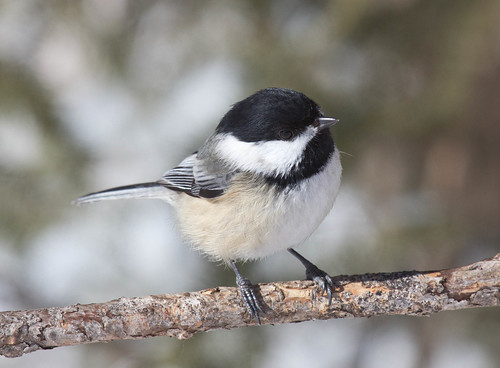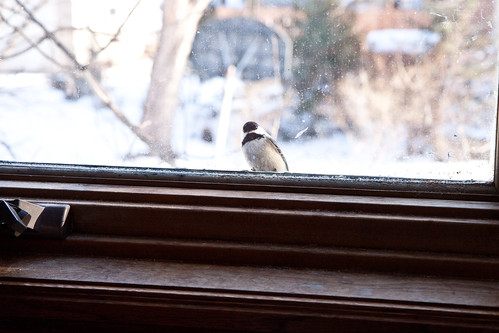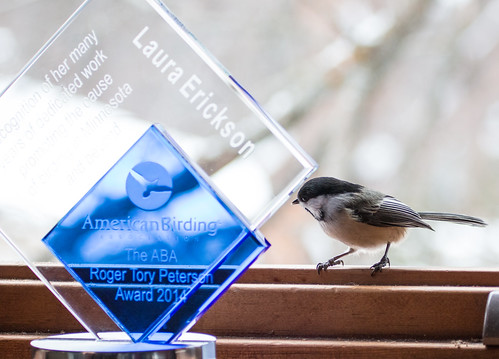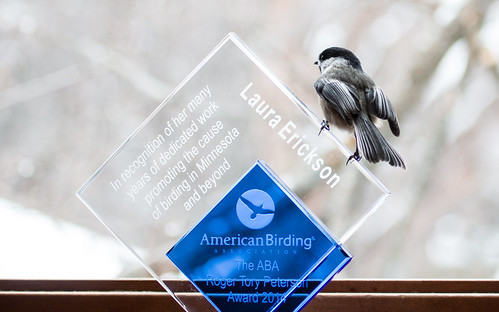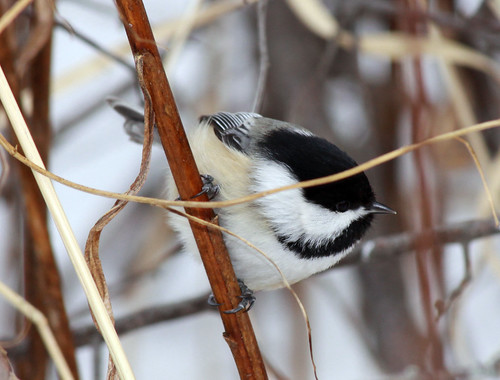When we’re all of us so isolated from friends, relatives, and even close family members who aren’t in our own household, people have been finding other ways to stay in touch. That’s been gratifying for me. I’ve been hearing from more listeners than usual, and am hearing a lot about their chickadees.
Robert Frost may have been right that "something there is that doesn’t love a wall," but nothing there is that doesn’t love a chickadee. Our Black-capped Chickadee is of course my favorite, but there are several others here in North America, and one kind or another can be found over the vast majority of the landscape except in the desert Southwest.
Chickadees are almost certainly not nearly as cheerful as we think, but somehow seeing and hearing them consistently elicits cheerfulness in us. When they fly up to us, or even to our hand, it may simply be that they’re intelligent enough to learn how to fully exploit feeding opportunities, but how can we humans not see that as friendliness?
When they tap on my window to get my attention, yes I know they associate me with food, but their recognizing me as an individual is genuinely soul-enriching.
When the American Birding Association gave me their Roger Tory Peterson Award, how could I not feel even more honored and gratified after my backyard chickadees alighted on it, as if signaling their approval?
Yes, I realize full well that they come to my window with the expectation that they'll receive fresh mealworms, but something there is in me that doesn’t love dry, clinical explanations that exclude more beautiful possibilities.
KAXE listener Polly Edington had written me a year ago asking about getting chickadees to feed out of her hand. She didn’t have any luck at first, but this March 13, she sent me an email with exciting news:
I got a chickadee to eat a mealworm out of my hand!! Then on later days chickadees and nuthatches got shy...they'd come to the pine tree above me but not to my hand...so I started putting the mealworms in a box feeder on the ground at my feet while I sat perfectly still...they loved that! Me too! It was fascinating just watching them!
Going early in the morn I have gotten to observe other wildlife! Today, looking from my bedroom window at our bird feeder on a post I saw what I think was a female goldfinch...would they be back this soon?I told her that some goldfinches winter up here. How very thrilled I was at her excitement. On March 20, she wrote back:
Yesterday I put on Facebook a video I took after the chickadees ate the mealworms and I'd refilled my feeder with seeds...just showing the feeder and my backyard.
What surprised me was as I was talking and filming the feeder a chickadee zoomed in and flew off with a seed. They have never done that for seeds (while I'm there)!!
Polly added:
Out of my chickadees I have two that I'm calling Mama and Youngster...'cause Mama is bigger and the Youngster is about 1/2 the Mama sized one!?Every chickadee out there is a fully-grown adult right now. They do range pretty widely in weight, running from 9 to 14 grams (about a third to almost half an ounce), the difference comparable to adult humans spanning weights between 120 and 186—obviously our species varies far more widely than chickadees do. And the difference in size in chickadees isn’t usually apparent to our eyes, because chickadee plumage is so thick. When one appears larger than another, it’s usually because that individual is colder, with its feathers much more fluffed out. When I was getting whole flocks of chickadees at my window alighting on my hand, one at a time, I could feel that some individuals were much lighter than others, but couldn’t actually see the difference. So it’s interesting that Polly has an outlier.
On March 23, she shared more observations:
What a morning with “my birdies”!! No longer have fresh mealworms so doused some dried ones with boiling water and took the wet ones out to my wooden feeder. I never thought about the weather being cold enough to freeze them to the feeder, but soon discovered my chickadees couldn't pick the worms up. After I loosened them a chickadee flew in and then perched on the rim of the feeder and “dropped” the worm on the ground and flew up to my knee and looked me in the face and I thought she might have said: “What are you doing? I know this isn't a fresh worm...I spit that one out...I didn't “drop” it!!!” After that she flew off, I picked up the worm and put it on my knee and another chickadee landed there and flew off with the worm!
Chickadees don't like to share the feeder so in between chickadees I whistled and called: chickadee, dee, dee...I must have offended one who flew within an inch of my mouth and hoovered there for a few seconds like a hummingbird...I imagined her saying to me, “Hey! You are NOT a chickadee!!”
(I was really shocked when the chickadee hopped up to my knee!!)It’s so fun to hear readers’ stories during these trying, isolating times. Polly generously shared the photos and video above. Stay safe and well, dear reader.
